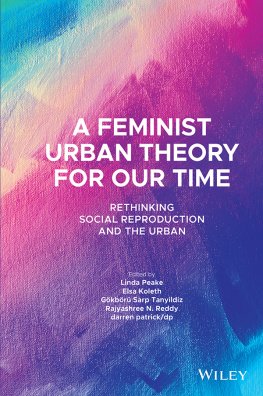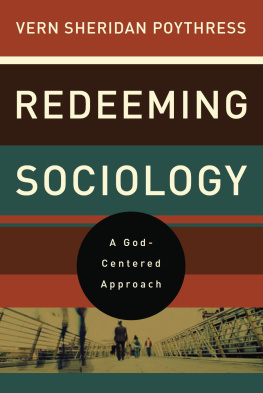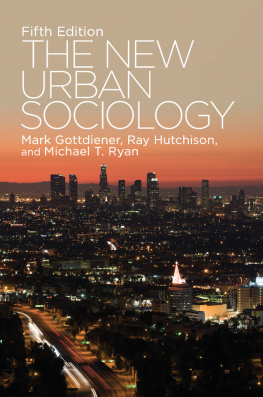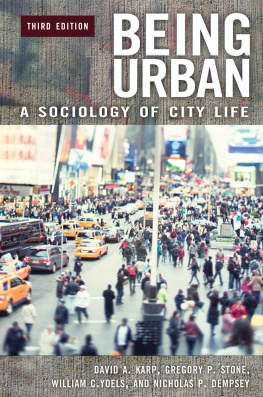The International Library of Sociology
AN APPROACH TO
URBAN SOCIOLOGY
Founded by KARL MANNHEIM
The International Library of Sociology
URBAN AND REGIONAL SOCIOLOGY
In 13 Volumes
| I | An Approach to Urban Sociology | Mann |
| II | City and Region | Dickinson |
| III | The City Region in Western Europe | Dickinson |
| IV | English Rural Life | Bracey |
| V | New Dubliners | Humphreys |
| VI | The Personality of the Urban African in South Africa | de Ridder |
| VII | The Regions of Germany | Dickinson |
| VIII | Revolution of Environment | Gutkind |
| IX | Rural Depopulation in England and Wales 18511951 | Saville |
| X | The Social Background of a Plan | Glass |
| XI | The Sociology of an English Village: Gosforth (The above title is not available through Routledge in North America) | Williams |
| XII | The West European City | Dickinson |
| XIII | Westrigg: The Sociology of a Cheviot Parish | Littlejohn |
AN APPROACH TO
URBAN SOCIOLOGY
by
PETER H. MANN
First published in 1965 by
Routledge
Reprinted 1998,1999, 2000, 2002
by Routledge
2 Park Square, Milton Park, Abingdon, Oxon, OX14 4RN
Transferred to Digital Printing 2007
Routledge is an imprint of the Taylor & Francis Group
1965 Peter H. Mann
All rights reserved. No part of this book may be reprinted or reproduced or utilized in any form or by any electronic, mechanical, or other means, now known or hereafter invented, including photocopying and recording, or in any information storage or retrieval system, without permission in writing from the publishers.
The publishers have made every effort to contact authors/copyright holders of the works reprinted in The International Library of Sociology. This has not been possible in every case, however, and we would welcome correspondence from those individuals/companies we have been unable to trace.
British Library Cataloguing in Publication Data
A CIP catalogue record for this book
is available from the British Library
An Approach to Urban Sociology
ISBN 0-415-17696-4
Urban and Regional Sociology: 13 Volumes
ISBN 0-415-17830-4
The International Library of Sociology: 274 Volumes
ISBN 0-415-17838-X
Publisher's note
The publisher has gone to great lengths to ensure the quality of this reprint but points out that some imperfections in the original may be apparent.
THIS preface is being written late in November 1964 shortly after I have checked through the galley proofs of the book. As I have read the galleys it has become apparent that many revisions could be made to bring facts more up to date, but such a task would almost inevitably mean that as soon as one revision was made some other government announcement or publication of a report would make me want to have the proofs back again. As it is, this book has been some time in preparation and so, for better or worse, I have decided that it must now go ahead.
Nevertheless, it is important to note that things are happening fast which affect the urban setting. A new government has already placed stringent restrictions on office building in the London area. Many plans to cope with the motor age are afoot. Regional planning, albeit as far as one can see yet only on an advisory basis, has come out of its lengthy period of obscurity. Reorganisation of government departments so as to work for greater degrees of coordination has been introduced. All these things will have their effects on urbanism in the months or years to come.
If the reader will accept that the manuscript of this book was completed before the change of government in October 1964 then it will be of interest to see whether some of the tentative forecasts which I have made are likely to come true.
This book covers a very broad field of sociology and, even in the specialised field of urban sociology it deals with some broad concepts. I am therefore chancing my arm with some of the ideas that I have put forward, but I hope that readers will accept that I have tried hard to be as objective as I can in a field where personal feelings often run high. I am more concerned with trying to present a sociological perspective than a guide to social policy.
My first interests in urban sociology were stimulated when, as a newly graduated research assistant, I worked for two years for Dr. Denis Chapman at Liverpool University. What I like to think back on as my apprenticeship with him was a time when many of my ideas were formed. No one could have asked for a kindlier or more stimulating master. After Liverpool I spent two years at Nottingham University as a research fellow under Professor W. J. H. Sprott who was my Ph.D. supervisor and is, of course, also the editor of the series in which this book is published. Professor Sprott has seen this book right through from the stage of the first synopsis right up to the last (I hope) grammatical error. The interest he has shown and the criticisms which he has given have been of incalculable help to me.
The ideas in the following pages are ones for which I take full responsibility, but I would like to acknowledge the stimulating ideas that I have had in discussions with Mr. R.J. Green of the Norfolk County Planning Department on town planning and with Miss B. A. Sainsbury of the Sociology Department at Sheffield University on sociological theory.
My wife has helped greatly in her attempts to improve the general standard of English in this book. If it is still not very good that is not her faultthe task was a heavy one. Mrs. Margaret Sayles of the Sociology Department at Sheffield University typed the manuscripts and worked with me on the checking of proofs. For her hard work, patience and good humour I am eternally in her debt.
As always in these cases, for any errors, omissions and so on I take full responsibility; I only hope there are not too many.
PETER H. MANN
University of Sheffield.
I HAVE entitled this book An Approach to Urban Sociology because it is seriously intended to be an approach. That is to say that the way in which the problem is tackled is, I hope, not quite the same as may be found in a number of standard texts on urban sociology. Indeed, it was deliberate policy in beginning this book to try to get away from the conventional text-book formula which appears to require an introductory chapter on the history of cities, and finally a chapter on either town planning or social change and the city.
The purpose of this book is to try to introduce an element of theoretical consideration into the study of urbanism in contemporary Britain. If this sounds a grandiose purpose it is certainly not meant to do. But it does seem to me that British urban sociology, itself a comparatively neglected field, tends to be greatly tied up with social policy, town planning and various aspects of social work. If urban sociology is worthy of the name sociology it should be more than any of these, even though it may well include such details within its purview.











